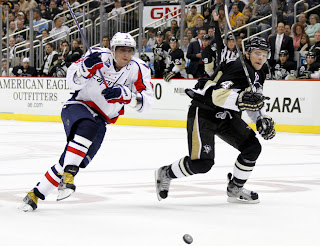Yes, the first post in a looooong time. So this has pretty much joined the "hey, I started a blog" graveyard...life happens. But I saw some rubbish that simply needed addressed in full. This post, written by Adrian Dater of the Denver Post, is stunning. Mostly because he sounds like a fanboy and a biased blogger, not a supposedly (and to my own occasional reading) solid hockey columnist with a good reputation.
One thing that is both good and bad about major daily papers having blogs is the fact that the editorial/thought filter process is sometimes not evident. Good in that we get pure thoughts at times, bad when those that are supposed to be "professional" makes themselves look just silly. It really makes you question what the difference between a dedicated, yet non-objective blogger and a sports journalist is? In some cases, an editor, built-in platform, and consistent check, apparently.
In this piece, Dater calls out all fans (himself included) that are from other cities for cheering on their favorite teams; Essentially calling these people "dorks". His biggest failure here is the failure to acknowledge that sports fandom, and especially fandom among dislocated fans away from the "home town", serves a much bigger purpose than simply going to a game to cheer.
Follow me on this...we are segueing to academic research mode. (i.e., Wann's Team Identification - Social Psychological Health Model). In this model, that has endured multiple examinations in peer-reviewed academic journals, Wann and colleagues state the following in an article in the Journal of Sport Behavior last year:
So to clarify, attending a sporting event involving your favorite team in another city clearly leads to temporary and may sometimes lead to permanent social bonds (as you are spending time with others that share some common bond; this is how relationships form people!).“Temporary social connections occur when a fan who does not reside in a community with enduring connections temporarily finds him or herself in the company of other fans of the team (e.g., a Chicago Cubs fan living in St. Louis who frequently watches Cubs games on television with several other Cubs fans). The increased social connections are then expected to increase social psychological well-being at either the state (temporary connections) or trait (enduring connections) level.”
So then, according to Adrian Dater's logic process here, everyone that (1) wants to cheer on their favorite team (or celebrate some type of self-identity), (2) had the gall to move from home, and (3) wants to socially connect with others they have something in common with is a dork? Using this logic, anyone who has moved in their lives and has gone to a church to meet others that share a faith are "dorks" and/or "foolish" (among the hundreds of examples I could give here).
To once again quote the previously mentioned Wann et al. article:
In other words, Adrian Dater has used the same exact coping mechanism for a loss that a fan would. The only thing is that fan isn't being paid to be objective as possible."The model also postulates that threats to social identity (e.g., poor team performance and player arrests) and subsequent strategic coping mechanisms (e.g., biased attributions) moderate the relationship between social connections and well-being."
There is nothing wrong with having a social identity and celebrating it with others. As one of these "dislocated fans", I can definitely tell you that in St. Louis a few years back (I live 3 hrs away), my wife and I would have probably talked to complete strangers if we had encountered a group of other people wearing Penguins jerseys/apparel. (NOTE: I must say I would have avoided anyone waving a f-ing terrible towel or in a Steeler jersey at a Pens game). That opportunity didn't present itself. Oh, and by the way, the Pens lost that game 1-0. I am hoping that I will have this opportunity in St.L or Nashville (even closer) sometime soon. Because if I do, this college professor and published sport fandom researcher will definitely be engaging in some dorky, foolish behavior.









